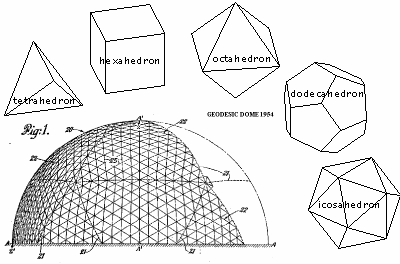Polyhedra and Geodesics
Tiling a surface is called tessellation. Hundreds of regular tiling patterns have been discovered, but few of these are potentially useful for constructing spatial databases. The simplest tessellations involve the use of simple shapes, such as triangles, rectangles and hexagons. A sphere can be tessellated more naturally and more uniformly if triangles rather than rectangles are used, although in neither case can all the subdivisions be all the same size and shape.
|
Bust of "Bucky" by Isamu Noguchi |
The breakdown of a sphere into triangular elements is the basis of geodesic domes, an invention of the architect, designer and philospher R. Buckminster Fuller (1895-1983). |
Most approaches to subdividing spheres start with one of the platonic solids, of which only five exist. Only these polyhedra have faces with equal area, equal edges and equal angles. Fuller's domes are all based on the 20-faced icosahedron. In our research we use the 8-faced octahedron.

